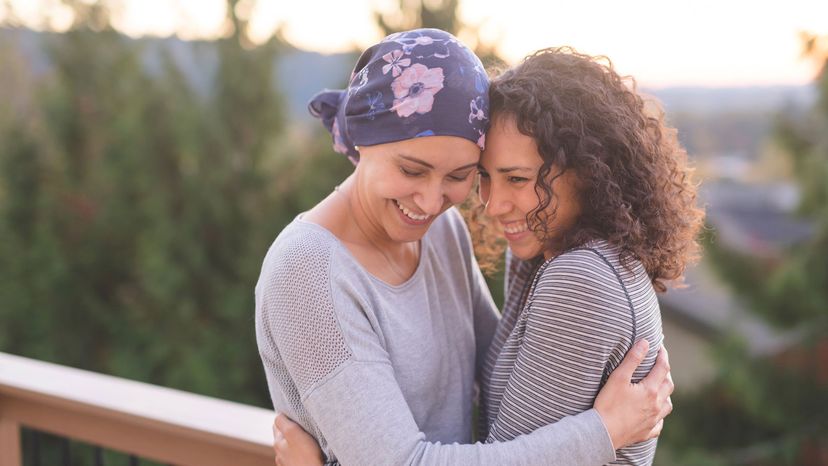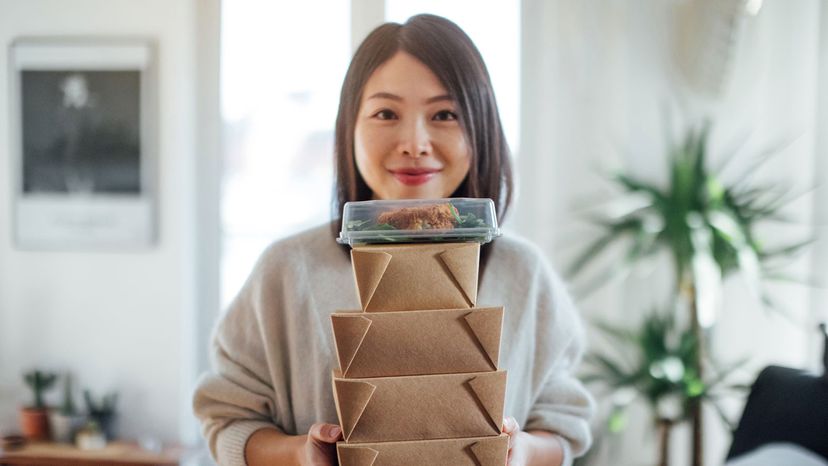 “Spending time with your loved one is often one of the best things you can do. FatCamera/Getty Images
“Spending time with your loved one is often one of the best things you can do. FatCamera/Getty Images
Everyone knows that going through chemotherapy is tough. But not everyone knows how best to help a friend or loved one dealing with the evil disease that is cancer. There’s no need to feel totally helpless, however. Although you can’t cure the disease, you can minimize some of the aches, pains, stresses and blues associated with the experience. Here are a few of our favorites.
1. Offer to Run Errands
Find out what errands need doing and take that off the plate of the patient and caregiver. For example, when RebateKey founder Ian Sells’ friend was diagnosed with cancer he took over the filling and pickup of any medications. "[Cancer patients] need a lot of drugs, depending on the symptoms or side effects of their chemo," he says via email. "Since getting your bottles refilled requires a short drive to a pharmacy, I’ve taken on the responsibility to do the task for him." He also checks in with his friend every Monday at 9 a.m. to see what other help he might need during the week. "Having a schedule can help add some form of routine, which is helpful for [him]."
2. Give Chemo-friendly Clothing
Chemo changes a person’s body in ways they never thought possible, so suggest or purchase clothing that will make chemo days that much easier on your friend or loved one.
For example, bulky chest ports are a necessary part of the chemo patient’s body, but regular clothing doesn’t comfortably accommodate them. "Healthwear" company Care+Wear offers clothing specifically designed to make chemo easier on patients. For example, the chest port access hoodies by Oscar de la Renta can be comfortably worn by patients "while discreetly providing easy clinical access to your chest and port area during chemotherapy and other treatments," according to the website.
PICC line covers are another must-have for anyone who has to have a semi-permanent IV. These were created by Care+Wear’s founder after he found out that loved ones were instructed to cut up tube socks and slide them on top of the IV tubes.
Since chemo patients often lose their hair, super-soft but stylish head coverings are key to keeping the head warm and the spirits up. Try ones from Chemo Fashion Scarf or Headcovers Unlimited for size!
3. Rally the Troops
With permission from the patient, get friends, family and community involved. Often, people really want to help out, but aren’t sure how to go about it. Give them solid options to choose from. For example, set up a Meal Train complete with allergies, food sensitivities, dates, times and so on. Or use a SignUp Genius to organize a "gift card drive," so that each person can donate a gift card or two for food or services. Little gestures like that go a long way toward making a person feel loved and cared for.
 “Bringing meals is a time-honored way to help someone who’s sick. Using a website like Meal Train ensures that a schedule is set up for meal delivery.Oscar Wong/Getty Images
“Bringing meals is a time-honored way to help someone who’s sick. Using a website like Meal Train ensures that a schedule is set up for meal delivery.Oscar Wong/Getty Images
4. Play Footsie
Here’s a small gesture that absolutely anyone can do! Pick up a pair or two of wool or thick, cotton socks to keep those little piggies warm during chemo. Bonus points if they’re full of personality! "If the socks are cute then the nursing staff has a great way to engage you in conversation," suggests Jennifer Boaro of Bellevue, Washington, who cared for her husband through lengthy treatments for acute lymphoblastic leukemia.
5. Complete Some Household Tasks
You know those endless chores that everyone has? They don’t stop with chemo. Offer to clean the house, mow the lawn, provide meals, walk the dog, babysit, do laundry, pay bills, take out the trash and so on. "One of the most common side effects of chemo is extreme fatigue, which makes sense because the process disrupts normal metabolic function," emails Dr. Andrea Paul medical adviser to Illuminate Labs. "Offering to help a chemo patient with some of their manual chores is a very thoughtful way to make a difference in their life and can often make more of a difference than a purchased gift or card."
6. Stock Them Up on Chemo-friendly Products
Chemo can wreak havoc on everything from skin to appetite. Put together a gift basket of products that are known to help out. For example, combat dry skin with a selection of unscented, natural lotions, suggests Tara Coyote, a best-selling author who battled cancer for four years. She suggests unscented lotions because chemo patients often develop a very sensitive sense of smell. She also recommends including a variety of bland crackers. "It is common to feel nauseous and having crackers around is handy when your tummy is upset. On this same note, peppermint tea also eases an upset stomach," she says via email.
Personal trainer and breast cancer survivor Melissa Rasbach of Kennesaw, Georgia, notes that coconut water really saved the day when she was in chemo. "Plain water did not taste good to me at all, but coconut water did," she recalls. "Plus, the added benefit of coconut water was a bonus." So be sure to toss a couple of bottles of coconut water in the basket, too. You never know what’s going to click for someone!
If you’re not local to the patient in question, try sending a chemo care basket from Rock the Treatment, available for men, women and children.
7. Go to Appointments With Them
In a perfect world, everyone has a dedicated caregiver who can shuttle them to and from appointments and keep track of all the tiny details. However, some caregivers still have to work, and some people don’t have anyone to fall back on at all. Fill in those gaps by driving the patient to and from appointments and be sure to take notes.
"Patients’ memories can be foggy during and after treatment, and the amount of information they receive can be overwhelming. Taking notes can ensure they have the information they need later," suggests Dr. Elliana Rose with Audiology Research in an email. Also, step in for follow-up appointments and scans, even once treatment is done. "They may not show it, but cancer patients often have a lot of anxiety about these appointments even years after treatment. A friendly face and someone to talk to can make a big difference."
8. Just Show Up
It may not seem like much to you but often all cancer patients want is someone to just spend time with them. They may want to talk about what’s going on healthwise, or something else to take their mind off the treatment. Or they may not want to talk at all. "The thing your friend may need most right now is a steady, calm presence to just listen or simply be there for them," says Helena Plater-Zyberk co-founder and CEO of Supportiv. "You can read a book, or scroll on your phone nearby, but don’t worry about initiating tough conversations or filling the void. Just make yourself available, and your friend will talk when it feels right to them."
Now That’s Helpful
People are more likely to accept help if you’re direct with the offer. "If you offer specific help, such as, ‘I can bring you soup this week,’ rather than, ‘Just let me know if you need help,’ you are much more likely to get an affirmative response," says Tara Coyote, author and former cancer patient. "It is generally hard for those going through cancer to ask and receive help, so the more direct you can be, the more likely your friend will take you up on your offer."





























